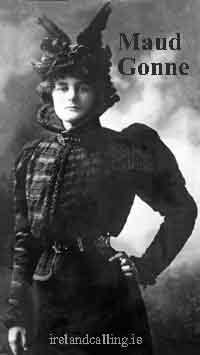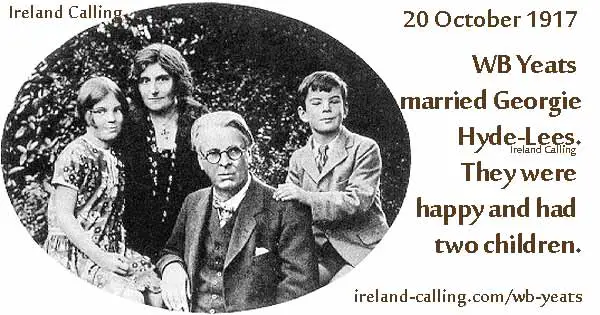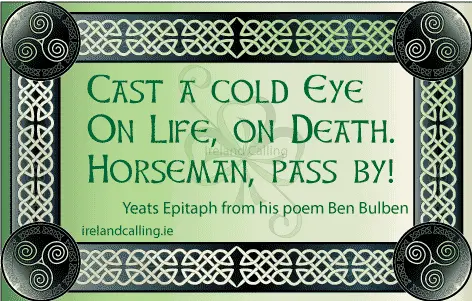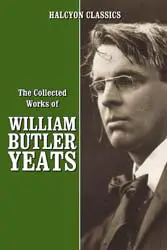William Butler Yeats is regarded by many as Ireland’s greatest ever poet.
In 1923 he became the first Irishman to win the Nobel Prize for Literature. The Nobel committee said it awarded him the honour because of his “inspired poetry, which in a highly artistic form gives expression to the spirit of a whole nation”.
It was a fair summary of the career of a man who more than any other helped spark the Irish Literary Revival.
Yeats was born in Sandymount, Co Dublin on 13 June 1865. His father was an artist and was delighted when William started to write poetry in his late teens.
However, Yeats didn’t just want to be another writer. His ambition was to recreate a specifically Irish literature, which he felt had been lost over the centuries.
He began to explore Irish legends, folk songs and fairy stories, which inspired much of his early work such as Down By the Salley Gardens, The Song of Wandering Aengus and Cuchulain’s Fight with the Sea.
His early work such as Lake Isle of Innisfree was often lyrical and celebrated the simplicity of Irish rural life.
Lifelong unrequited love for Maud Gonne

In the 1890s, he began to take an increasing interest in Irish nationalism. He founded various literary societies and even joined the Irish Republican Brotherhood, although he was later to leave it after becoming disillusioned with politics.
It was during this time that he fell in love with the beautiful actress and Irish nationalist Maud Gonne. She did not return his feelings but liked him as a friend.
Yeats was devastated when she refused his offer of marriage; his anguish was made all the worse when she later married the revolutionary leader John MacBride – a man Yeats regarded as a drunken lout.
Yeats remained obsessed with Gonne for most of his life. When Gonne divorced MacBride in 1905, Yeats again asked her to marry him and again she refused him – she did, however, sleep with him on one occasion in 1908.
Nevertheless, Gonne did not want to pursue the relationship so Yeats then asked her for permission to propose to her daughter Iseult. She too refused him so Yeats, who was 52, married 25-year-old Georgie Hyde-Lees, a woman he had known for many years.
Surprisingly, perhaps, considering the age difference and Yeats’ obsession with Gonne, his marriage turned out to be very happy and the couple had two children together.

Yeats’ changing styles – a terrible beauty is born
The style of Yeats’ writing changed several times during his long career. The early simple lyricism was replaced by the strange more mysterious complex verse to be found in collections like The Wind Among the Reeds.
His interest in politics and Irish nationalism was reignited by the unexpected success of the 1916 Easter Rising. A further change in style followed with Yeats commentating on momentous topical events.
It led to some of his best known poems such as Easter 1916, with the famous line “A terrible beauty is born”, and An Irish Airman Foresees his Death, which was written about Major Robert Gregory.
Gregory was the son of Lady Gregory, the owner of Coole Park and Yeats’ most enthusiastic and wealthy supporter. He often stayed with Gregory’s family at Coole Park, which features in his writing.

Poet, theatre manager and Irish senator
Yeats wrote plays as well as poems and with the help of Lady Gregory and others he founded the Abbey Theatre in Dublin. Yeats’ play Cathleen ni Houlihan was performed there in 1899 with Maud Gonne in the lead role.
During this time, Yeats threw much of his energy into managing the theatre and championing the cause of other writers like J M Synge, whose Playboy of the Western World was performed at the Abbey in 1907.
In 1922, Yeats was appointed as Senator for the newly formed Irish Free State and served for two terms.
He was awarded the Nobel Prize for Literature in 1923 and continued to write successfully until his death in France on 28 January 1939.
In 1948, his body was moved from Roquebrune in France to Drumcliff in Co Sligo where Yeats had spent much of his youth.
More about his relationship with Maud Gonne
The Lake Isle of Innisfree
He Wishes for the Cloths of Heaven

